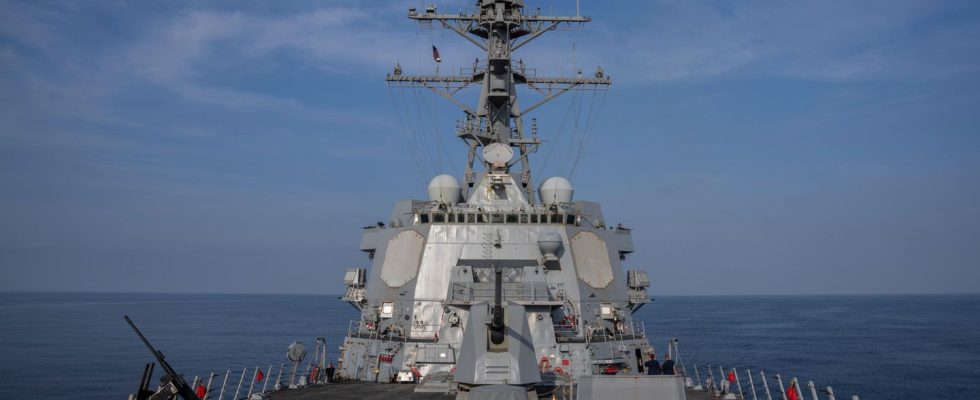Operation Aspides
EU foreign ministers decide to start naval operations in the Middle East
A US aircraft carrier in the Red Sea
© Bernat Armangue / AP / DPA
The European navy is facing a dangerous military operation: in the Red Sea it is supposed to protect merchant ships from attacks by the Houthi rebels in Yemen. Now it’s clear when it starts.
The foreign ministers of the EU states have decided to start a new military operation to secure merchant shipping in the Middle East. Several EU diplomats confirmed this to the German Press Agency in Brussels on Monday. The plan for Operation Aspides calls for European warships to be transported into… Red Sea and neighboring sea areas. These are then intended to protect merchant ships there from attacks by the militant Islamist Houthis from Yemen. The militia wants to force an end to the Israeli attacks in the Gaza Strip, which followed the Hamas massacre in Israel, by shelling ships.
Germany wants to take part in the operation with the frigate “Hessen”. The warship with around 240 soldiers on board was sent from Wilhelmshaven to the Mediterranean on February 8th. The “Hessen” was last in a port on the Greek island of Crete. The mandate for the operation is to be decided by the Bundestag this Friday.
The 143 meter long frigate is equipped with anti-aircraft missiles and was specifically designed for escort and maritime control. According to the Bundeswehr, the ship can use its special radar to monitor airspace the size of the entire North Sea. The weapon systems are capable of engaging targets at a distance of up to 160 kilometers. Germany also wants to provide staff for the operation’s headquarters in Larisa, Greece, as well as helicopters.
Europe wants to secure the Red Sea trade route
The EU’s hope is that shipping companies will again send their merchant ships through the Red Sea without hesitation. Recently, many had avoided the shortest sea route between Asia and Europe. Because an alternative route around the Cape of Good Hope in South Africa is much longer, this now has significant implications for companies.
German Foreign Minister Annalena Baerbock (Greens) said of the decision in Brussels: “We have seen that the entire global economy is being hit by the Houthis’ attacks on civilian shipping.” It is not just European ships that are repeatedly endangered by Houthi missiles in the Red Sea, but also all international shipping. “That’s why it’s important for us that we as the European Union make a contribution to protecting civilian shipping in the Red Sea.”
Houthis attack British freighter: “catastrophic” damage
Meanwhile, the militant Islamist Houthis in Yemen say they have again attacked a freighter in the Red Sea. The ship suffered “catastrophic” damage, the militia said on Monday morning. According to Houthi, it is said to be the British-registered ship “Rubymar”. According to the tracking service Vesselfinder, it sails under the flag of Belize.
The UKMTO, part of the British Navy, said on Monday that a ship had been attacked in the Bab al-Mandab Strait. The crew is safe and the crew has left the ship. The time of the incident is given as Sunday evening (local time).
The Houthi militia from Yemen has repeatedly attacked ships in the Red Sea since November. The Red Sea is considered one of the most important shipping routes for world trade because it connects the Mediterranean with the Indian Ocean via the Suez Canal in Egypt. The Houthi militia wants to force an end to the Israeli attacks in the Gaza Strip by shelling merchant ships, which followed the unprecedented massacre by the Islamist Hamas in Israel on October 7th. The attacks are now having a significant impact on the global economy. The USA and Great Britain are therefore directly attacking Houthi positions in Yemen.

